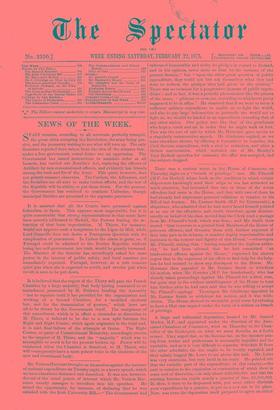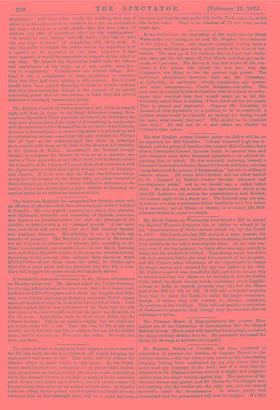A large and influential deputation, headed by Mr. Samuel Morley,
M.P., and appointed under the direction of the Asso- ciated Chambers of Commerce, went on Thursday to the Chan- cellor of the Exchequer, on what we must describe as a fool's errand. They urged that, as the Income-tax on the incomes aris- ing from trades and professions is necessarily impolitic and in- equitable, and as it is very difficult to separate Schedule D from the other schedules, the tax ought to be totally repealed, and they calmly begged Mr. Lowe to set about this task. Mr. Lowe was very courteous, but very lucid in his reply. He pointed out that the variable part of the expenditure of this country,—the part in relation to the expansion or contraction of which there is some sort of discretion,—is only about £30,000,000, and that the existing Income-tax yields nearly a quarter of this, £6,500,000. If then, it were to be dispensed with, you must either diminish your expenditim by a quarter, or put on a new tax in its place. Now, was even the deputation itself prepared to agree on either alternative? Still more, what would the working-class say, if either a middle-class tax were replaced by a tax on necessaries like sugar or corn, or a great middle-class tax were taken off without any offer of equivalent relief to the working-class ? " It would be very wrong," said Mr. Lowe, "for him to hold out any hope to them " of complying with their wish. It was impossible to cripple the public service by depriving it of a quarter of its resources at one blow, and .even if that were possible, it would be impossible to concede all the relief to one class. He trusted the deputation would take the fulness and explicitness of his reply, as it was meant, namely,— "as a compliment." Compliments are relative things. Per- haps it was a compliment to these gentlemen to convince them that they had been making a silly request. But it could hardly have been exactly flattering to them to receive evidence that they were reasonable beings, at the expense of an equally convincing proof that on this subject at least they had proved themselves extremely unreasoning beings.



































 Previous page
Previous page